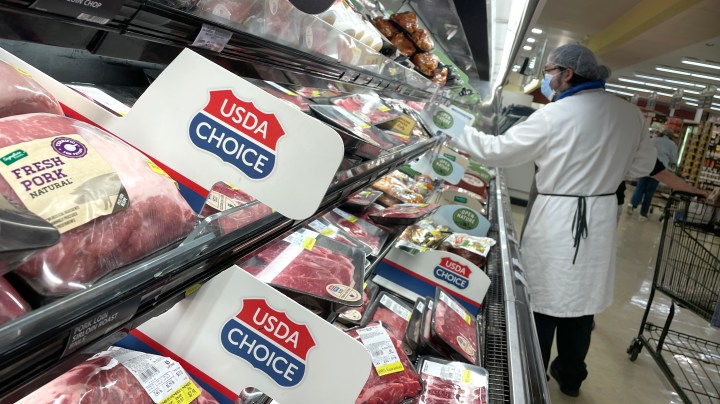
As inflation mounts, a prime culprit is the price of meat


The prices of meat, poultry, fish and eggs are up more than 8% since just April and more than 15% since just before the pandemic. Those higher prices are forcing some people to make changes when they go to the grocery store.
In Washington, D.C., Lisa Thomas complained about rising costs after leaving a grocery store with her two granddaughters.
“It’s mostly the products we need: milk, eggs and necessities, even the price of tissue has gone up,” she said. “We’re struggling right now, and the prices are still going up.”
Prices for “food at home,” as the Bureau of Labor Statistics calls the category, are up about 4.5% year over year. About half of the overall increase in prices, National Economic Council Director Brian Deese said at a press briefing in September, stems from just three meats: beef, pork and poultry. “And in beef and pork, we’ve seen double-digit increases in prices over the last couple of months,” he said.
The Joe Biden administration blames that on consolidation in the meat-and-poultry-processing industry, with bottlenecks and disruptions at just a few companies causing outsize effects at grocery stores all over the country.
Those processors are working under challenging circumstances, points out Veronica Nigh, senior economist at the American Farm Bureau Federation.
“We continue to have issues around labor availability, not just in agriculture or specifically the meat sector, but in the U.S. economy at large,” she said. “So that, of course, has an impact on agriculture. And then you look at things like transportation, that’s — again — impacting lots of different segments. But when you add all of those constraints, there’s a lot of headwinds facing meat prices.”
All of this can make a trip to the grocery store into a crash course in supply chain economics, according to Anna Zeide, who teaches history and runs the food studies program at Virginia Tech.
“We don’t think too hard about where our food comes from,” Zeide said. “And these kinds of moments sometimes shed a little bit of light on that complexity and make people pause and reflect on how it is that the price of my food is tied to these massive shipping barges crossing the ocean.”
Because Americans spend a relatively small slice of their income on food compared to the rest of the world, Zeide said, many don’t readily notice changes in food prices, especially if they are middle class or wealthier. But thanks to the pandemic and the effects of climate change, “the insulation that we have is thinning, is weakening.”
When people start to feel those price impacts, they tend to change their shopping habits — at least in the short term — said Amy Bentley, a professor of food studies at New York University.
“So for instance, if they prefer steak and can afford it, they may shift to hamburger,” she said. “Or if they particularly like a brand-name product, they might shift to a cheaper generic product.”
That’s exactly what Washington resident Lisa Thomas said she’s been doing. “I won’t buy the steaks if they’re not on sale anymore,” she said. “And my grandkids love steak fajitas.”
These kinds of changes tend to be temporary, Bentley said. But the culture of food — and in the U.S., that means the culture of meat — is hard to change. Because, for most people, food is more than just sustenance.
“Changing your food habits too much can eliminate that comfort element of food or produce stress because you’re no longer eating your familiar foods [in] your familiar ways,” Bentley said.
Which is why food prices will likely have to stay elevated for quite a while before Americans change the way they eat.
There’s a lot happening in the world. Through it all, Marketplace is here for you.
You rely on Marketplace to break down the world’s events and tell you how it affects you in a fact-based, approachable way. We rely on your financial support to keep making that possible.
Your donation today powers the independent journalism that you rely on. For just $5/month, you can help sustain Marketplace so we can keep reporting on the things that matter to you.










